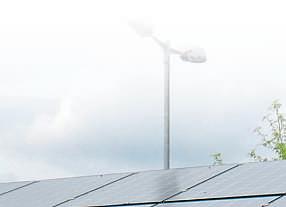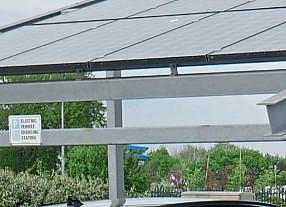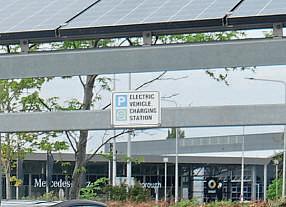
8 minute read
Taking Charge – Garden Centre EV Charging
Taking charge
With just eight years to go before the UK steps away from the sale of petrol and diesel vehicles, garden centres are grappling with a conundrum – is this the right time to install electric vehicle charging facilities?
Garden centres are heavily dependent on car users, so providing EV charging stations in their car parks – especially for those with spaces for hundreds of vehicles – appears to some to be an obvious opportunity, both to provide a customer service and to create a potential new revenue stream.
Dobbies has already thrown its hat into the ring, pledging to install charging hubs in 30 of its 68 stores in a deal with GRIDSERVE, while the Blue Diamond Group says it will install EV charging in all its centres this year through a supplier-funded scheme.
How ready are others to follow suit? GTN has been attempting to find out. We invited a cross-section of leading operators to share their thinking with us – but the disappointingly low response could indicate that this is not yet a top priority for most. Meanwhile, it would seem there is a growing need for more information from suppliers to add clarity in what is still a fledgling market place and make it easier for garden centres to decide whether or not to become adopters at this early stage
Martin Stewart, Managing Director of Stewarts Garden Centres (which operates three centres on the south coast of England), drives an electric car, which he charges at home. “So far we have not installed electric charging points,” he told us. “I would be very interested in hearing how much they are being used by those who have installed them.
“One of the reasons for buying it [an all-electric car] was to understand where this electric journey is taking us.
“To my mind, people with electric vehicles will charge them at home and go about their day, retuning to recharge at home at the end of the day. That will suffice for 95% of our customers, even those driving, say, 35 miles to come to us. It is the cheapest and most convenient option for the vehicle owner.
“What do we want to put charging points in for? I would never use one. It is the main trunk routes that need rapid chargers. ”
Guy Topping, Managing Director of the award-winning Barton Grange Garden Centre near Preston, is also ambivalent at this stage. “We have looked at them and nearly proceeded a couple of times, but have always been put off by:
Not being sure we were installing the best/ right ones
Thinking they are going to quickly improve so we will end up with dated technology
Darran Oakley (Squire’s Purchasing Director) at one of the new electric charging points at Squire’s Garden Centres.
Cars charging at a Dobbies Garden Centre


More information


gridserve.com uk.mer.eco pod-point.com











Having no great demand from customers
The sight of empty charger points at most local sites
“I’m looking forward to reading others’ views.”
At Baytree Nurseries & Garden Centre in Lincolnshire, which has a customer base stretching across vast swathes of eastern England, General Manager Nigel Wallis says the business has not yet been persuaded that EV charging is right for them. “We are not really sure what to do as of yet. We have had a couple of meetings [with suppliers], and when they leave we are as confused as we were when they arrived!” He suspects it will mean investing “a huge amount of money”.
But north west of Baytree, Matthew Bent, MD of another multiple award-winning centre, Bents Garden & Home at Warrington, has adopted a more positive stance.
Bents installed a Tesla charging station 2 years ago. “Overall our experience has been really positive,” he told us. “It started very slow when we installed them with very few people using them. With the increase in the number of electric cars we find they are occupied around 40-50% of the time, but it’s like buses, no one on and then you have a queue of people waiting.”
He says that it’s difficult to know for sure at the moment whether EV charging benefits the business, but tends to think it will in the long run. “It is a ‘nice to have’ but going forward, having a network of charging points the customers can use while they wait will be

Charging at Dobbies. The owner of the blue Audi enjoyed a coffee in the Dobbies cafe while is car was topping up with power.



seen as a key service which garden centres should offer. As an electric car driver I know how hard it is to find and use charging points at the moment.”
Taking the long view, Bents plans to install more charging points in the next 12 months.
At the end of last year, charging points were installed at Squire’s Garden Centres in each of the centres Badshot Lea, Milford, Shepperton and Twickenham. They were 22 kw fast charges and add to the existing 3kw charging spaces at the Squire’s centre in Woking. “We are committed to supporting people to lead more sustainable lives, and one way we can do this is by encouraging the use of more environmentally friendly modes of transport,’ says Sarah Squire, Chairman of Squire’s.
Blue Diamond CEO Alan Roper is sure customers will expect the service as much as they expect a parking space. “Not having this facility will be detrimental to your attractiveness as a first-choice garden centre visit. It’s a fully funded scheme by the supplier,” he told us.



Considerations
Without a doubt, there’s a lot of homework to be done before deciding if EV charging is right for you – but the suppliers we have checked out all offer to hold your hand while you’re making your mind up. Before you invite them to meet you, it will pay to understand how far your customers travel to reach you and how long they generally stay (the so-called ‘dwell time’). These factors will massively influence whether you opt for so-called ‘fast’ – but actually slow – chargers (like those for home users), ‘rapid’ chargers (which might offer an 80% charge within, say, 40 minutes, ideal for a quick visit to your cafe for coffee and cake) or ultra-rapid points which might suit customers in a hurry (reps, click & collect customers). You may want to provide the service for the sole use of your staff.
Suppliers will talk you through the deals on offer –which will range from those where you buy and install the points, then charge a rate per charge to get a pay-back on the capital cost, to those where the provider installs, services and maintains the points at no upfront cost to you and gives you a pay-back, perhaps based on profit-sharing.
You will need to think about whether to offer charging as a free service (as some supermarkets and retail parks do, in return for your custom) or whether you want it to contribute to your bottom line.
The cost (and viability) of an installation will depend on your connection point – how far away you are from a suitable grid connection. The work may involve building out extra infrastructure.
When we asked about a typical ROI, estimates varied wildly. Matthew Bent reckoned it could be as little as two to three years, depending on the nature of the installation and the type of deal you negotiate, while Joe Topping (nephew of Barton Grange MD Guy), who works for Mer UK, a supplier backed by Statkraft, Europe’s biggest supplier of renewable energy, says it could be 8 to 10 years for a full installation. It’s a longterm investment for both parties – surely something that any sustainability project demands anyway.
As the government is keen to see the EV charging infrastructure grow as quickly as possible, grants towards the cost of installation are currently available from the Office for Zero Emission Vehicles to qualifying businesses – £350 per socket up to a maximum of 40 sockets per business (e.g.if you have 40 sites, that’s one per site…). You can roll out your allocation over time.










